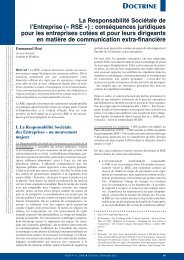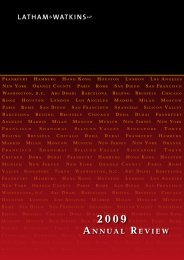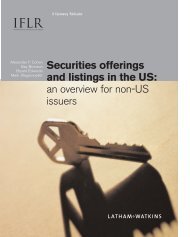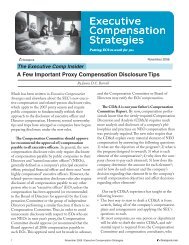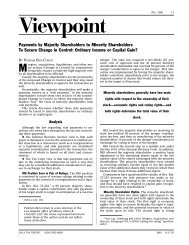Papilsky Rules - Latham & Watkins
Papilsky Rules - Latham & Watkins
Papilsky Rules - Latham & Watkins
You also want an ePaper? Increase the reach of your titles
YUMPU automatically turns print PDFs into web optimized ePapers that Google loves.
<strong>Latham</strong> & <strong>Watkins</strong> | Client Alert<br />
Endnotes<br />
1<br />
See SEC Release No. 34-62539; File No.<br />
SR-FINRA-2010-029 (July 21, 2010). NASD<br />
<strong>Rules</strong> 2730, 2740 and 2750 are generally<br />
referred to as the “<strong>Papilsky</strong> <strong>Rules</strong>” because<br />
of the court decision with which they are often<br />
associated, <strong>Papilsky</strong> v. Berndt, Fed. Sec. L. Rep<br />
(CCH) 95,627 (S.D.N.Y. June 24, 1976).<br />
FINRA issued a notice to its members relating<br />
to the proposed rule on August 4, 2009 and<br />
originally submitted the rule proposal to the<br />
SEC shortly thereafter, but then withdrew it<br />
for technical reasons in November 2009. The<br />
proposed rule was re-submitted to the SEC,<br />
without substantive change, on May 27, 2010.<br />
See FINRA Regulatory Notice 09-45 (August<br />
2009) (FINRA Notice 09-45); SEC Release<br />
No. 34-62299 (June 16, 2010) (the Proposing<br />
Release).<br />
2<br />
The definition of “fixed price offering” is now set<br />
forth in the supplementary materials to FINRA<br />
Rule 5141 and is essentially unchanged from<br />
the definition currently set forth in NASD Rule<br />
0120(h). As so defined, the term “fixed price<br />
offering” refers to securities publicly offered<br />
(in whole or in part) in the United States at a<br />
stated offering price or prices. See FINRA Rule<br />
5141.04. The term includes offerings registered<br />
in the United States under the Securities Act<br />
of 1933, as well as offerings that, although<br />
public, are not required to be registered under<br />
the Securities Act pursuant to an applicable<br />
exemption (e.g., bank securities offered pursuant<br />
to Section 3(a)(2) of the Securities Act). The<br />
term, however, does not include offerings of<br />
securities that are privately placed or offered and<br />
sold pursuant to Rule 144A under the Securities<br />
Act. It is also important to note that the term<br />
“fixed price offering” does not prohibit “multiple<br />
price” offerings so long as the different fixed<br />
prices are adequately disclosed. See Proposing<br />
Release; NASD Notice to Members 81-3.<br />
3<br />
FINRA Notice 09-45.<br />
4<br />
NASD Rule 2730 was intended to prevent<br />
members from paying a higher price for the<br />
securities taken in trade, thereby lowering the<br />
purchase price of the securities purchased by<br />
the investor in the fixed price offering.<br />
5<br />
The purpose of NASD Rule 2740 was to prevent<br />
members from granting discounts to favored<br />
investors, such that those investors would be<br />
able to purchase securities in the offering at a<br />
lower price than other investors.<br />
6<br />
NASD Rule 2750 was intended to prevent<br />
purchasers from obtaining a discount through the<br />
establishment of an affiliated broker-dealer that<br />
would receive designated selling credit for the<br />
sale.<br />
7<br />
FINRA Rule 5141(a).<br />
8<br />
FINRA Rule 5130 generally prohibits FINRA<br />
members from selling equity securities offered<br />
in initial public offerings to certain “restricted<br />
persons” (a term which includes, among others,<br />
broker-dealers and certain persons having a<br />
beneficial interest in a broker-dealer).<br />
9<br />
FINRA Rule 5141.03 provides that ordinary<br />
course transactions between a member and its<br />
affiliates that are unrelated to the purchase or<br />
sale of securities in a fixed price offering will not<br />
be deemed to confer a “reduced price” under the<br />
rule.<br />
10<br />
FINRA Rule 5141.01.<br />
11<br />
FINRA Rule 5141.02.<br />
12<br />
FINRA Rule 5141.05.<br />
13<br />
The adoption of FINRA Rule 5141 does not<br />
impact existing NASD Rule 2420 (Dealing with<br />
Non-Members), although such rule is the subject<br />
of another pending FINRA rule proposal. See<br />
FINRA Regulatory Notice 09-69 (December<br />
2009) (proposing, among other things, to delete<br />
current NASD Rule 2420 and replace it with new<br />
FINRA Rule 2040) (FINRA Notice 09-69).<br />
Also note that current NASD Rule 2420(c)<br />
continues to require an agreement by any<br />
non-US broker-dealer that receives a selling<br />
concession, discount or other allowance from<br />
a FINRA member to agree to the restrictions<br />
set forth in the rule as if it were itself a FINRA<br />
member in respect of any sales of securities<br />
it makes to persons in the United States. The<br />
FINRA proposal discussed in FINRA Notice<br />
09-69 would eliminate this requirement and<br />
further simplify the provisions of existing NASD<br />
Rule 2420. In particular, if adopted as proposed,<br />
new FINRA Rule 2040 would (in pertinent part)<br />
prohibit members from, directly or indirectly,<br />
paying or offering to pay any “compensation,<br />
fees, concessions, discounts, commissions or<br />
other allowances to . . . any person that is not<br />
registered as a broker-dealer under Section<br />
15(a) of the Exchange Act but, by reason of<br />
receipt of any such payments, is required to be<br />
so registered under applicable federal securities<br />
laws and [Exchange Act] rules, regulations and<br />
published guidance issued by the SEC or its<br />
staff in the form of releases, no-action letters or<br />
interpretations.” See FINRA Notice 09-69.<br />
4 Number 1069 | August 5, 2010



